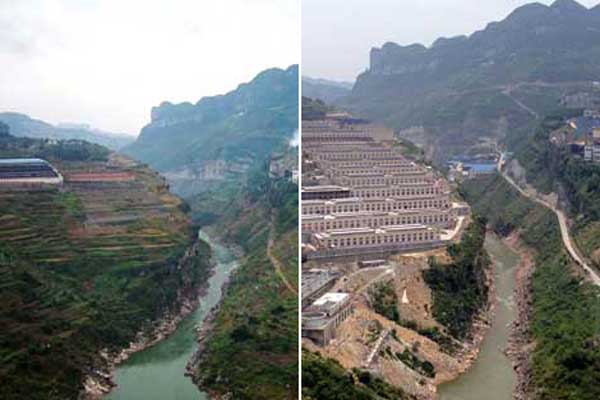Fish ecosystem on Yangtze 'on verge of collapse'
Updated: 2013-08-16 01:42
By Yang Yao (China Daily)
|
|||||||||||
Human activity along the upper reaches of the Yangtze River — such as building hydropower stations and excessive fishing — has pushed its aquatic ecosystem to the verge of collapse, a report released on Thursday warns.
Researchers suggested starting a fishing ban along the entire river and enacting a national law to protect the "mother river" of China, as its fishery resources are experiencing a severe recession.
The number of fish in four major species has shrunk from more than 30 billion in the 1950s to less than 100 million, and the number of breeds has been reduced from 143 to 17, according to the report released by the Yangtze River Fishery Resources Committee under the Ministry of Agriculture and the World Wide Fund for Nature.
 |
|
Landscape changes since 2005 along the banks of the Chishui River, a tributary of the Yangtze River, suggest the grave effects of human activity on the ecosystem of China’s longest river. [PHOTO BY WANG LEI / FOR CHINA DAILY] |
The report is based on a 12-day scientific expedition in five provincial-level regions in June, in which 32 researchers from government agencies and NGOs participated.
It was the first expedition of its kind to study the upper reaches of the Yangtze River regarding wetlands, aquatic diversity and water environment, according to the WWF.
Besides the sharp decrease in the number of fish, some species, such as the finless porpoise, have already become extinct, said Zhao Yimin, head of the Yangtze River Fishery Resources Committee.
The plight along the river is not catching much public attention "as people can buy fresh fish from a wet market every day. They don't realize how serious the situation is", Zhao said.
"The source species are reducing, leading to unsustainable development of aquaculture and an increasingly fragile ecosystem."
Zhao said China's fishery resources will be drained soon if no immediate action is taken.
The report cited over-exploitation of hydropower and lax law enforcement as major reasons behind the dire situation.
On the Jinsha River, 25 hydropower plants are being, or will be built 100 km apart along the 2,308 km tributary of the Yangtze, according to the country's energy development plan.
Once completed, the plants will have power-generating capacity equivalent to four Three Gorges Dam projects.
"It will cut the river into sections, and completely change the aquatic environment, bringing a devastating impact to species and water quality," Zhao said.
According to environmental laws, a power plant has to pass an environmental impact assessment before construction starts. However, a majority of the projects go ahead without any assessment, Zhao said.
The environmental impact assessment for the Shuangjiangkou hydropower project, for instance, was passed two years after construction started in 2011.
Chen Jiakuan, a professor at Fudan University in Shanghai who participated in the research expedition, said that 450 million metric tons of sand flowed downstream in the Yangtze in the 1950s, compared to 150 million tons at present.
"The sand is silting up at reservoirs, leading to the degradation of water quality. It also changed the environment for fish," Chen said.
Hydroelectric power plants also change water temperatures and a river's flow, which damages native plants and animals in the river and on land, he said.
As for overfishing, experts said 100,000 tons of fish caught in the Yangtze is an amount beyond what its ecosystem could take.
An annual three-month moratorium during the fish spawning period on the Yangtze River is far from enough for fish reproduction, Zhao said.
"The best way is a total ban on fishing," he said.
But he said the policy is hard to implement as it involves a lot of issues such as compensating those who live on fishing.
He suggests establishing a department coordinating different interest groups to solve the problem.
"The department should be responsible for drafting compensation plans to ensure the fishing ban is effective."
As the Yangtze River basin covers 19 provinces and cities, accounting for 18.8 percent of the land area in China, saving the river and its fish resources is not an easy task.
New legislation is needed to raise public awareness, the report said.
Ren Wenwei, head of the Shanghai conservation program of WWF, said the current regulations are not enough.
"The Yangtze River Fishery Resources Committee is a vice-ministry level department, which has limited power to coordinate different interest groups," he said.
He and other scientists propose drafting a Yangtze River Basin Management Act and establishing a coordinating department directly under the State Council.
Related Stories
Bohai natural ecosystem 2011-09-04 07:54
Coastal development threatens ecosystem 2010-03-03 07:38
Dam of a hydropower station breaks in Guangdong 2013-08-15 15:47
Engineers develop 'fish lane' for dam in Jiangxi 2013-06-24 07:13
Today's Top News
No remorse as Abe marks surrender
China summons Japanese ambassador over shrine visit
Fish ecosystem on Yangtze 'on verge of collapse'
Five-year plan to treat water, soil losses
First public rental housing fund launched
Chinese pesticide firms aim to grow US market share
China Mobile looks to data services
China to overtake US as No 1 purchaser
Hot Topics
Lunar probe , China growth forecasts, Emission rules get tougher, China seen through 'colored lens', International board,
Editor's Picks

|

|

|

|

|

|





